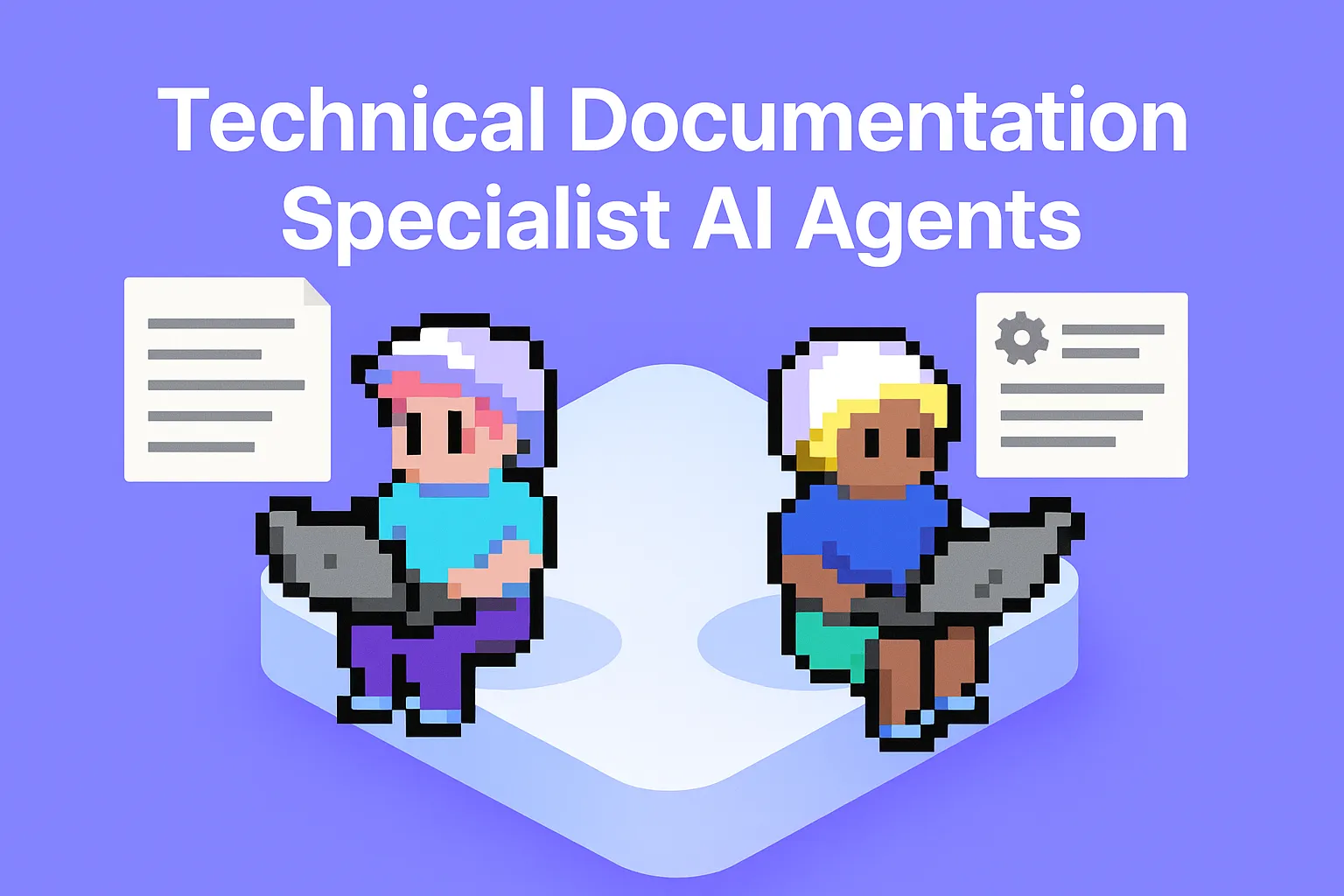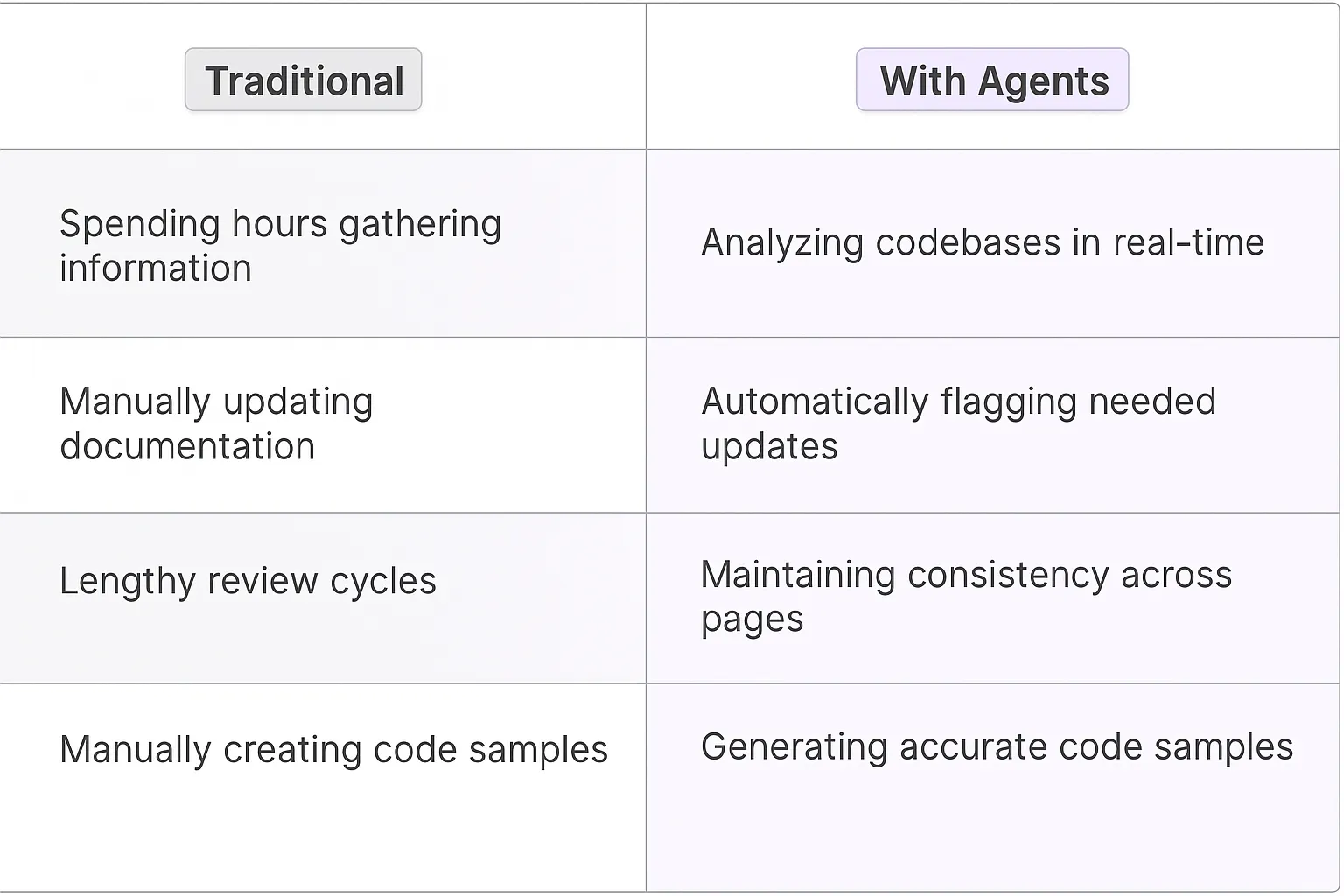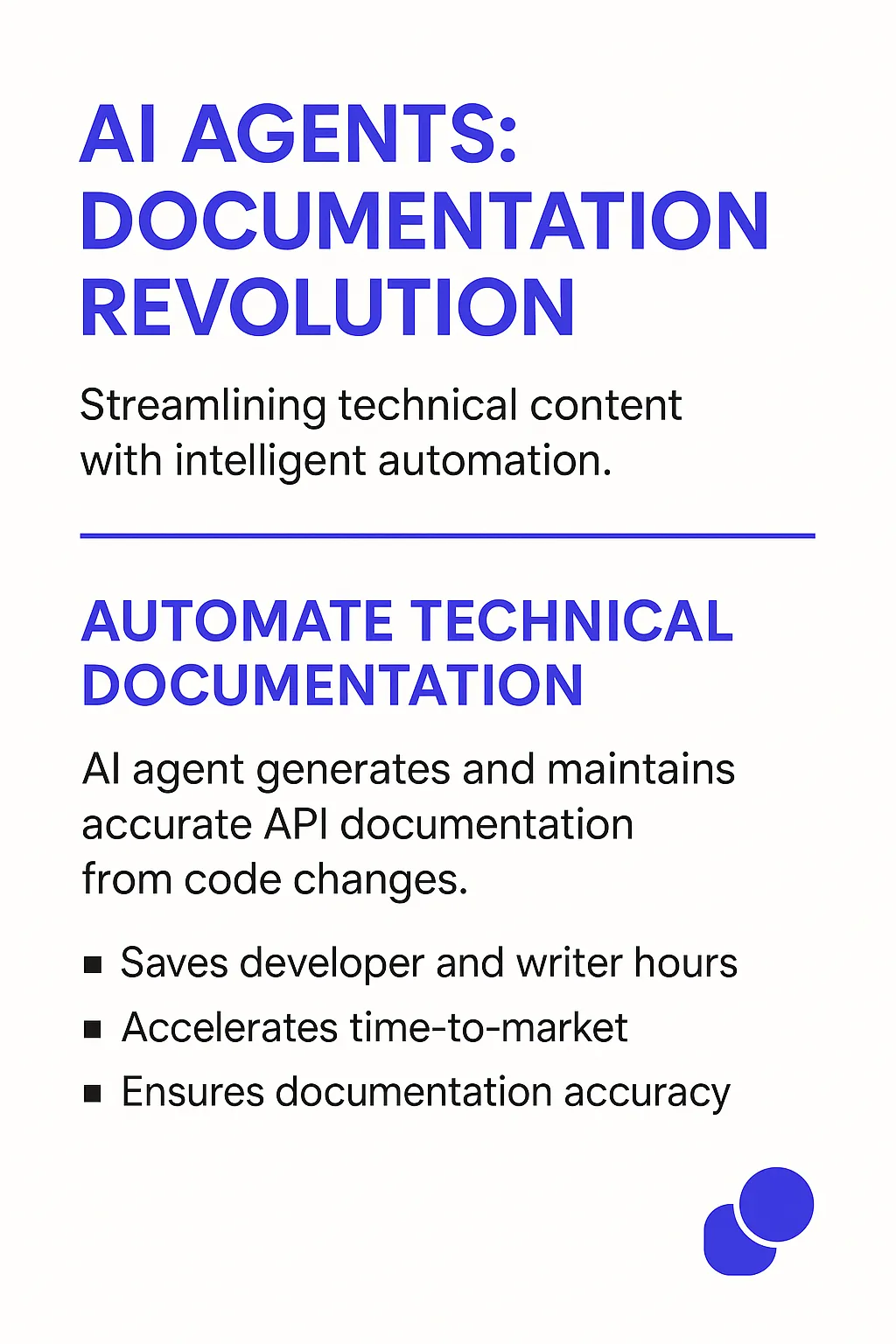Technical Documentation Specialist AI Agents are sophisticated digital teammates that analyze, generate, and maintain technical documentation across various domains. They work alongside human technical writers to process complex technical information, generate accurate documentation, and keep content updated as systems evolve. These agents leverage advanced natural language processing and machine learning to understand technical concepts and translate them into clear, accessible documentation.

Technical documentation teams traditionally relied on a mix of manual processes and basic automation tools. Documentation specialists spent countless hours combing through code repositories, interviewing developers, and piecing together fragmented information from various sources. They used tools like Confluence, SharePoint, and static documentation generators, which required significant human oversight and constant updates.
The process was painfully linear: gather requirements, write drafts, send for review, incorporate feedback, and publish. Each cycle could take weeks, leaving documentation perpetually outdated in fast-moving development environments.
AI Agents fundamentally transform how technical documentation gets created and maintained. These digital teammates can analyze codebases in real-time, automatically detecting API changes, identifying breaking changes, and flagging areas that need documentation updates.
The network effects are particularly powerful here. As more developers interact with the documentation, AI Agents learn from these interactions, continuously improving their ability to:
The cold start problem that typically plagues documentation projects gets solved through AI Agents' ability to bootstrap initial documentation from existing codebases and technical discussions. This creates a powerful flywheel effect: better docs lead to more developer adoption, which generates more usage data, which helps AI Agents create even better documentation.
From a growth perspective, this represents a step-function improvement in documentation quality and maintainability. Documentation specialists can focus on high-value activities like information architecture and developer experience, while AI Agents handle the heavy lifting of content generation and maintenance.

Technical documentation teams face a constant challenge: keeping pace with rapid development cycles while maintaining high-quality documentation. AI agents transform this dynamic by handling the heavy lifting of initial documentation drafts, allowing human technical writers to focus on refinement and strategic improvements.
The real power emerges when technical writers leverage AI agents for repetitive documentation tasks. For example, when documenting APIs, the AI can analyze endpoints and generate baseline documentation, while technical writers focus on adding context, use cases, and industry-specific insights that truly matter to developers.
Technical documentation AI agents shine when integrated directly into the development pipeline. They can monitor code changes, automatically flag outdated documentation, and suggest updates based on new implementations. This creates a continuous documentation process that matches the speed of modern development cycles.
By analyzing commit messages, pull requests, and code changes, these digital teammates can maintain documentation accuracy without constant human oversight. This shifts technical writers from maintenance mode to focusing on documentation strategy and information architecture.
The next frontier for technical documentation AI agents lies in predictive documentation needs. By analyzing user behavior patterns and support tickets, these systems will anticipate where documentation gaps exist and proactively suggest new content areas. This creates a dynamic documentation ecosystem that evolves with user needs rather than playing catch-up.
As natural language processing capabilities advance, we'll see these agents handle increasingly complex technical concepts while maintaining the clarity and accuracy essential for technical documentation. The key will be finding the right balance between AI-generated content and human expertise to create documentation that truly serves its users.

Technical documentation specialists face an ever-growing mountain of complex product information, API specifications, and system architectures that need clear explanation. AI agents are transforming how these specialists tackle documentation projects across different sectors. The depth and breadth of what's possible when pairing human expertise with AI capabilities opens up new approaches to traditionally time-intensive documentation tasks.
The real power emerges when technical writers leverage AI agents as research partners and content collaborators. In software companies, AI helps parse through thousands of lines of code comments and technical specs to surface the most relevant information. Manufacturing firms use AI agents to maintain consistency across massive product documentation libraries spanning multiple product lines and versions. Enterprise tech companies deploy these digital teammates to rapidly generate accurate API documentation that stays in sync with frequent software updates.
What makes this particularly interesting is how AI agents adapt to different documentation standards and style guides while maintaining the human technical writer's voice and expertise. They're not replacing the technical documentation specialist - they're amplifying their capabilities by handling the heavy lifting of information gathering and initial drafting, letting specialists focus on accuracy, clarity, and strategic documentation planning.
The software development industry faces a persistent challenge: maintaining comprehensive technical documentation that evolves as rapidly as the codebase itself. Technical Documentation Specialist AI agents are transforming how development teams approach this traditionally time-intensive process.
At companies like MongoDB and Elastic, engineering teams deploy these digital teammates to analyze codebases, API changes, and system architectures in real-time. The AI agent monitors git commits, pull requests, and code comments, automatically generating and updating documentation that reflects the latest changes.
A concrete example: When a development team at a mid-sized SaaS company implemented a Technical Documentation Specialist AI agent, they saw a 71% reduction in documentation-related tickets. The AI agent maintained their OpenAPI specifications, automatically updated SDK documentation across five programming languages, and flagged inconsistencies between code implementations and existing documentation.
The most compelling aspect isn't just the automation - it's the network effects. As more developers interact with the AI agent, it learns team-specific conventions, terminology, and architectural patterns. This creates a compounding knowledge base that makes future documentation increasingly accurate and contextually relevant.
The ROI becomes evident in three key metrics:
This shift represents a fundamental change in how technical documentation evolves alongside software development, making comprehensive documentation a natural byproduct of the development process rather than a separate, often-neglected task.
The healthcare industry drowns in regulatory documentation requirements, with medical device manufacturers particularly feeling the strain. Technical Documentation Specialist AI agents are creating a new paradigm in how these organizations handle their complex documentation needs.
A medical device company I advise recently deployed an AI documentation specialist across their R&D division. The impact was profound - the AI agent maintains their 510(k) submission documents, tracks design history files, and ensures compliance with evolving FDA requirements.
The most fascinating aspect is how the AI agent handles the intricate web of cross-references between design controls, risk management files, and validation protocols. When an engineer updates a design specification, the AI automatically propagates changes through related documentation, maintaining regulatory compliance while reducing human error.
Real numbers tell the story. The company's documentation team previously spent 40% of their time cross-checking regulatory requirements against their documentation. Post-implementation, they saw:
The network effects in healthcare documentation are particularly powerful. As the AI agent processes more regulatory documents and interaction patterns, it builds an increasingly sophisticated understanding of both explicit requirements and implicit industry best practices.
One unexpected outcome: The AI agent identified documentation patterns that predicted potential compliance issues before they materialized. This predictive capability helped the company proactively address regulatory concerns, avoiding costly remediation processes.
The growth loops are clear: Better documentation leads to faster approvals, which generates more data for the AI to learn from, creating an increasingly valuable documentation ecosystem. This compounds with each regulatory cycle, making the documentation process more robust and efficient over time.
Building an effective technical documentation specialist AI agent requires navigating several complex technical hurdles. The agent needs to parse and understand diverse documentation formats - from Markdown and reStructuredText to complex API specifications. Context retention becomes critical when handling large codebases or technical systems with intricate dependencies.
Training data quality presents another significant challenge. Technical documentation varies widely across organizations, programming languages, and industries. The AI model needs exposure to high-quality examples that demonstrate clear technical writing, proper formatting, and accurate technical details. Many organizations' existing documentation may be inconsistent or incomplete, making it harder to build reliable training datasets.
Integration with existing documentation workflows requires careful consideration. Development teams often follow established processes for documentation updates, version control, and review cycles. The AI agent needs to fit seamlessly into these workflows without disrupting team productivity or creating additional overhead.
Knowledge base maintenance becomes increasingly complex as systems evolve. The agent must stay current with new features, deprecated functionality, and changing best practices. This requires regular model updates and a robust system for handling documentation versioning.
Technical accuracy is non-negotiable in documentation. While AI agents can generate coherent technical content, they may occasionally produce plausible-sounding but incorrect information. Implementing robust review mechanisms and validation processes helps catch potential errors before they reach end users.
Style consistency across documentation requires careful attention. Different organizations maintain specific style guides and terminology preferences. The AI agent needs fine-tuning to align with these requirements while maintaining technical accuracy and readability.
When handling proprietary technical information, data security becomes paramount. Organizations need to ensure the AI agent processes sensitive technical details without exposing intellectual property or confidential information. Compliance requirements may also limit how certain technical information can be processed or stored.
Access control and authentication mechanisms need careful design to ensure only authorized team members can modify documentation through the AI agent. This includes tracking changes, maintaining audit logs, and implementing appropriate approval workflows.
The adoption of Technical Documentation Specialist AI Agents marks a fundamental shift in how organizations approach technical documentation. The technology creates powerful network effects - as documentation quality improves, user engagement increases, generating more data that further enhances the AI's capabilities. For technical writing teams, this represents a step-function improvement in productivity and documentation quality.
Looking ahead, the combination of human expertise and AI capabilities will continue to evolve, creating increasingly sophisticated documentation systems that adapt to user needs and technical complexity. Organizations that effectively implement these digital teammates gain a significant competitive advantage through better documentation, faster development cycles, and improved user experiences.